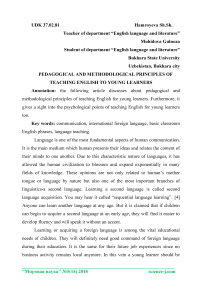Pedagogical and methodological principles of teaching English to young learners
Автор: Hamroyeva Sh.sh., Muhidova G.
Журнал: Мировая наука @science-j
Рубрика: Основной раздел
Статья в выпуске: 5 (14), 2018 года.
Бесплатный доступ
The following article discusses about pedagogical and methodological principles of teaching English for young learners. Furthermore, it gives a sight into the psychological points of teaching English for young learners too.
Communication, international foreign language, basic classroom english phrases, language teaching
Короткий адрес: https://sciup.org/140263583
IDR: 140263583
Текст научной статьи Pedagogical and methodological principles of teaching English to young learners
Language is one of the most fundamental aspects of human communication. It is the main medium which human presents their ideas and relates the content of their minds to one another. Due to this characteristic nature of languages, it has allowed the human civilization to blossom and expand exponentially in many fields of knowledge. These opinions are not only related to human’s mother tongue or language by nature but also one of the most important branches of linguistics-a second language. Learning a second language is called second language acquisition. You may hear it called “sequential language learning”. [4] Anyone can learn another language at any age. But it is claimed that if children can begin to acquire a second language at an early age, they will find it easier to develop fluency and will speak it without an accent.
Learning or acquiring a foreign language is among the vital educational needs of children. They will definitely need good command of foreign language during their education. It is the same for their future job experiences since no business activity remains local anymore. In this vein a young learner should be equipped definitely with at least one international foreign language in order to be able to use personal capacity in life fully. Lack of language ability for communication of this sort will hinder them from using job and life opportunities that will come up. In other words, learning foreign languages may help them better plan their lives socially, academically, and professionally. [2, 129-158]
Moreover, if children learn or speak a second language by hearing it in the environment in which they live, they are acquiring it as they do their mother tongue, but if they learn it with any other way, they are learning it like any other subject they study. Then it will be related to teacher’s proficiency and method of teaching language. So let’s talk about how it will be in English. Why should it be in the English Language one might ask? According to David Crystal, a world-renowned linguist, the English Language had in recent years gained significant prominence in multitudes of human knowledge especially in the field of science and mathematics. It is also one of the most widely and extensively taught foreign languages in many schools in the world. [4]
One of the most important things is to teach them with using basic classroom English phrases such as Greeting or “Please, sit down”. Due to these expressions, they will hear repeatedly throughout their study of English. Likewise, students will also feel more comfortable if teacher stick to a regular schedule so if teacher decide to make changes, implement them over a period of time rather than all at once. Constantly review and avoid introducing too much vocabulary at a time. Students may not remember material from one day to the next so repetition is important. The more students are exposed to certain material, the faster they will learn it. [3]
Generally, teacher mustn’t forget that students at this age, teachers are responsible not only for starting to teach them English, but also for preparing them for their next level of education. Student will perform better in their classes if they behave well and have good understanding of basic principles. It basically depends on teacher’s skill and proficiency.
Список литературы Pedagogical and methodological principles of teaching English to young learners
- Brown, D. B. (2000). Principles of Language Learning and Teaching. New York: Longman
- Hudelson, S. (1994). Literacy Development of second Language Children. In Educating Second Language Children Fred Genesee (ed.). Cambridge: Cambridge University Press (pp. 129-158)
- Bejarano, Y., 1994, A Model of Integrated Groupwork Methodology for the Foreign Language Classroom, in S.Sharan (Ed.), Handbook of Cooperative Learning Methods. US: Greenwood
- http://www.intime.uni.edu/model/teacher/teac4.html


